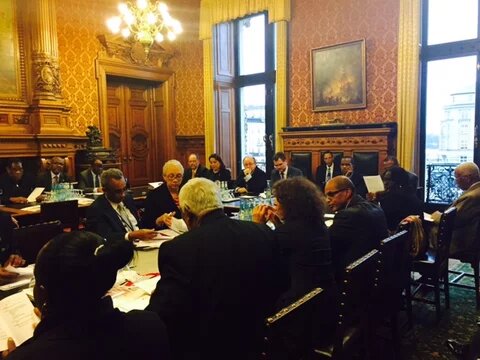Hamburg.- The EU-LAC Foundation will uphold the increasing prominence of the Caribbean in its programme of activities in order to ensure that the Caribbean civil society fully participates in the bi-regional relationship.
That was the announcement made by the EU-LAC Foundation’s executive director, Jorge Valdez, at the meeting held with a delegation of ministers from the Caribbean Community Secretariat – CARICOM, and this organisation’s Secretary General, Irwin LaRocque on the 3rd of March in Hamburg’s City Hall.
“We have always highlighted that without a fully-fledged Caribbean participation, the CELAC-EU strategic partnership is not complete” prompted Valdez to the Caribbean delegation, comprising the Ministers for Foreign Affairs from Bahamas, Guyana, Haiti, Granada, Jamaica, St. Kitts and Nevis, and Trinidad and Tobago, in addition to Antigua and Barbuda’s Minister for Tourism and Energy and members of the diplomatic corps from Barbados, Belize, Dominica, Santa Lucia, St. Vincent and the Grenadines, and Suriname.
The executive director supported his claim by listing some activities carried out by the Foundation for promoting the presence in the Caribbean bi-regional relationship, such as the symposium held in Brussels about the future of Small Caribbean Island States (SIDS) and the annual open evening held in the Foundation’s headquarters in Hamburg, so that the Caribbean consular representatives make their countries’ cultural diversity and wealth known.
Valdez stressed that “the Foundation’s headquarters will always be open to the Caribbean countries, particularly when many of them lack consular representation in Hamburg”, and invited them to take advantage of all the instruments offered by the Foundation.
“The Foundation – the executive director highlighted – is developing, in association with the Italian region of Lombardy, a record of district competitiveness (clusters) in five key sectors (agro-industry, automobile/aeronautic, renewable energies and environmental management, tourism and creative industry) which will allow to establish bi-regional value chains based on innovation, technology and knowledge”.
“The Caribbean countries should be highly integrated into this process, because of the importance of some of these sectors to their economy”, added Valdez who did not overlook the increasing importance of SIDS and the Caribbean countries in the economy of the sub-region, with a growth of 2.2 per-cent in those English-speaking Caribbean countries, according to the data from the Economic Commission for Latin America and the Caribbean.
Valdez informed the CARICOM delegation, in Germany by invitation of the German Federal Ministry of Foreign Affairs, that after the forthcoming UE-CELAC Summit of Heads of State and Government in Brussels, the Foundation will develop new research projects and multi-sectorial events, some of them “should respond to the specific interests of CARICOM members”.
With a view to mainstreaming Caribbean interests in the Foundation’s work, the executive director suggested the theme of climate change as a starting point. With no intention of underestimating the on-going regional initiatives, like the Caribbean Community Climate Change Centre or the Sustainable Development Institute of the University of West Indies, he reminded that the EU-CELAC Action Plan considers climate change as well as biodiversity, energy and the environment to be key issues to ensure environmental sustainability in this sub-region.
Valdez, thus, invited the ministers to identify and propose issues, which like climate change, could be of interest for their countries. At the same time, he proposed the an exhaustive identification of initiatives and civil society organisations working on this issue in the Caribbean. This, in his opinion, would not only exclude duplicity, but also will reinforce these actions through exchanging of good-practices, ideas and creation of new partnerships, and the Caribbean presence in bi-regional networks.
The Minister for Foreign Affairs from Trinidad and Tobago, Wilnston Dockeran, agreed with Valdez on the need to search for convergence of views beyond frontiers and stood up for a new dialogue, one that allows a greater presence of the Caribbean regarding the instruments for decision-making and supports its integration in the world’s economy.
Jamaica’s Minister of Foreign Affairs and Foreign Trade, Arnold Joseph Nicholson, reiterated his commitment and support for the bi-regional partnership and the Foundation’s work; however, underscored that for the Caribbean countries a deep discussion with regards to security was required, “a key issue for our countries and utterly impossible to leave out if we want to improve our dialogue” voiced the Minister.
Carolyn Rodriguez-Birkett, Guyana’s Foreign Affairs Minister and current chairman of CARICOM, valued and appreciated the Foundation’s work and engagement with the Caribbean: “It has been a very fruitful meeting and we will undoubtedly carefully analyse the proposals presented to us”, affirmed the minister, adding that the relationship between Latin America, the Caribbean and the European Union, a relationship that symbolizes the EU-LAC Foundation, is of a great importance and potential, especially with regards to the search for common responses for major issues like climate change. Ms Rodriguez-Birkett also pointed out that many Caribbean countries share the same views as the European Union on the climate change.
